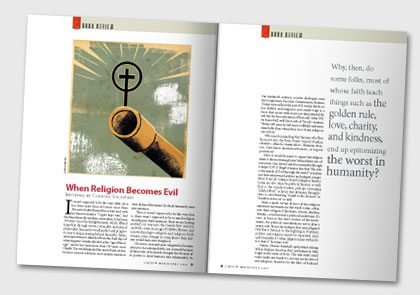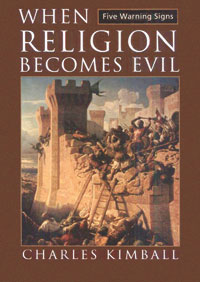When Religion Becomes Evil
Clifford R. Goldstein March/April 2009
It wasn’t supposed to be this way. After all, it has been more than 400 years since Rene Descartes locked himself in a room and, with his famous mantra “Cogito ergo sum,” laid the foundation for modern rationalism. It has been 300 years since the Enlightenment, which offered hope that, through reason, rationality, and natural philosophy, humanity would perfect and progress its way to utopia, leaving behind the myths, fables, and superstitions it inherited from the dark days of what Auguste Compte derided as the “age of theology.” And it has been more than 150 years since Charles Darwin eliminated the need of any creator, because natural selection and random mutation were declared the means by which humanity came into existence.
Thus, it wasn’t supposed to be this way; that is, there wasn’t supposed to be so much religion and religious faith anymore. Here we are, having pushed our way into the twenty-first century, and still—even in an age of CERN, iPhones, and nanotechnology—religion and religious faith remain, even stronger in some places than anyone would have ever imagined.
Of course, in recent years religion has become a force to be reckoned with; not so much because of the power of its moral strength but because of its power to drive humans into inhumanity. In the twentieth century, secular ideologies were the boogeymen: Fascism, Communism, Nazism. Today, especially in the post 9/11 world, the focus has shifted, and religion is now center stage as a force that carries with it not just the potential for evil but for the realization of that evil. After 9/11 we know full well the truth of Pascal’s maxim: “Never will men do evil more willfully and more cheerfully than when they do it from religious conviction.”
Who needs reminding that the men who flew those jets into the Twin Towers weren’t Kantian idealists, atheistic materialists, Humean skeptics, Derridean deconstructionists, or logical positivists?
Now, it would be naïve to argue that religion alone is the motivating factor behind these acts of terrorism. One doesn’t need to remember (though it helps) G.W. F. Hegel’s famous line that “the state is the march of God through the world” to realize just how intertwined politics and religion can get. Most, if not all, violence done by religious fanatics today are also done by political fanatics as well: that is, the suicide bomber, perhaps screaming “Allah Akbar!” as he (or she) detonates the explosives, is also thinking “Death to the Zionists” or “Death to America” as well.
Even a quick survey of most of the religious extremist movements in the world today—whatever their religion (Christians, Jewish, Muslim, Hindu)—would reveal a political undertone. It’s rare, at least in the most violent of the movements, for political considerations not to play a major role. From the violence that once plagued Northern Ireland, to the fighting in Kashmir, politics and religion cannot be separated. And, unfortunately, it’s when religion mixes with politics that it “becomes evil.”

When Religion Becomes Evil. By Charles Kimball (Harper San Francisco, 2002)
Hence, Charles Kimball’s aptly titled volume When Religion Becomes Evil, published in 1992 (right in the wake of 9/11). The title itself could easily make one think it’s just one in the slew of anti-religious diatribes by the likes of Richard Dawkins (The God Delusion), Sam Harris (The End of Faith), and Christopher Hitchens (God Is Not Great). The only problem, however, is that Kimball is an ordained Baptist minister and a Christian. Working from radically different premises than does Hitchens and Company, he of course comes to a radically different conclusion about potential solutions.
One thing, though, Hitchens and Kimball would agree on: religion can be exploited and turned into a force for evil. It’s the question of how, and why, that Kimball explores.
“Understanding the factors,” he writes, “that can and do lead people of faith and goodwill—
wittingly or unwittingly—into destructive and
evil patterns of behavior must be a high priority on the world’s agenda.” A sentiment no doubt echoed even as, perhaps, the smoke from the World Trade Center catastrophe hadn’t yet fully cleared.
Why, then, do some folks, most of whose faith teaches things such as the golden rule, love, charity, and kindness, end up epitomizing the worst in humanity? The answers, of course, are complex, and Kimball wisely avoids any simplistic, one-size-fits-all response. Early on, though, he does deal with what he calls “absolute truth claims,” which, simply put, is that each religion makes claims on truth that, by nature, must mean that the other man’s “absolute truth claims” must be wrong. The Christian absolute truth claim that Jesus is the Messiah, the Son of God who died for the sins of the world, by default automatically means that Jews, Muslims, and in fact any other faith that denies that Jesus is the Messiah, the Son of God who died for the sins of the world, are wrong. At the same time, those who deny that belief must, by default, believe that the Christians and their “absolute” truth claim is, in fact, false. Multiply these conflicting “absolute truth claims,” especially on what many religions believe are doctrines which constitute, Kimball writes, “the foundation on which the entire structure rests,” and it’s not hard to see why tensions rise.
Kimball goes through a host of examples religion becoming evil—from David Koresh, Muslim extremism, Christian, Jewish, Buddhist, and Hindu—in each case looking at the basic assumptions of these groups and why, he believes, those assumptions lead these folks to everything from mass suicide, to mass murder, to both, or in some cases to just an extremism that defies logic or reason. In one particularly moving section, he recounts the story of a girls’ school that caught fire in Saudi Arabia but the firemen were forbidden by the religious police to enter on the fear that some of the girls would not be properly attired. As a result, 15 of the girls perished. That, it seems, was even too much for the Saudis, and the outcry in the country brought about some changes in the oversight of women’s education.
What, then, is the solution? Kimball, in great contrast to
Illustration by Edel Rodriguez Hitchens and so forth, believes that “people of faith offer the best hope for correcting the corruptions leading to violence.” In the final chapter, he seems to argue for some kind of ecumenical dialogue between faiths, in which each seeks to draw out what they can from the others. While better than doing nothing, the solution hardly seems feasible. The kind of religions folks willing to engage in these discussions are precisely the kind we don’t have to worry about (Can one imagine Osama bin Laden or the Taliban engaged in interfaith dialogue?). For the extremists, the ones of their faith willing to talk like this are often deemed apostates, themselves worthy of some sort of censure, or worse.
No, it wasn’t supposed to be like this. Religion was supposed to have died off, slowly replaced by the gods of science, rational inquiry, a priori materialism, and the like. It hasn’t. Nor was it supposed to be like this, either: folks killing others in the name of a faith that espouses peace and kindness to others. But it is like this, and one of the greatest challenges of our times is how to deal with it.
Article Author: Clifford R. Goldstein
Clifford Goldstein writes from Ooltewah, Tennessee. A previous editor of Liberty, he now edits Bible study lessons for the Seventh-day Adventist Church.